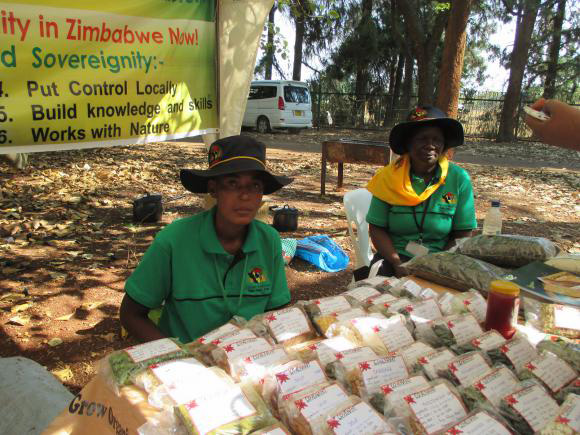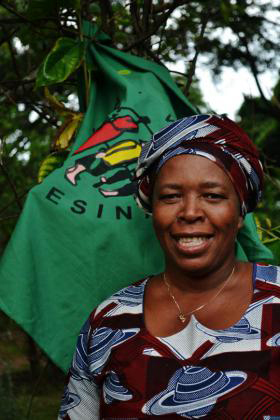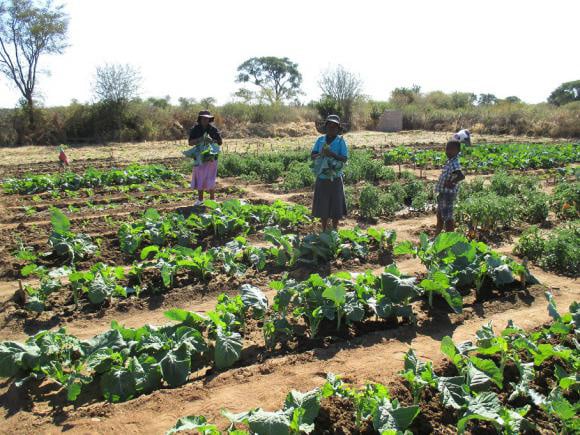
An interview with La Via Campesina General Coordinator Elizabeth Mpofu.
Elizabeth Mpofu of Zimbabwe is General Coordinator of the international peasant movement La Via Campesina, a coalition of 164 organizations in 73 countries around the world, representing about 200 million peasant, landless, indigenous, and other farmers. She is also Chairperson of Zimbabwe Organic Smallholder Farmers Forum, and herself a farmer.
Who we are fighting for is every single peasant farmer – more than 200 million – on the planet. People are eager to join hands in building a global voice.
Transnational corporations are pushing policies in African countries for industrial farming and the use of GMO [genetically modified] seeds, while grabbing our land and [stealing] our natural resources. No one should come and tell us how to produce food.
In Via Campesina, we believe in controlling our land and seeds and producing the healthy food that we want, the way we want. Our response is to fight for food sovereignty against these transnational corporations that are connected to the [New Alliance for Food Security and Nutrition of the] G8, the Alliance for a Green Revolution in Africa, the World Trade Organization, and free trade agreements that don’t recognize the needs of peasants or the poor.
 Elizabeth Mpofu with the banner for La Via Campesina. (Photo: Elizabeth Mpofu)Via Campesina formed [in 1993] when [a group of] peasants united to form a strong voice and strategize on the issues they were suffering from. Over time, Via Campesina became a global movement to advocate for policies which really meet the needs of the poor and marginalized, while fighting against those that do not. We develop global actions on agroecology, biodiversity, seeds, land and water territories, stopping transnational corporations, climate and environmental justice, trade, and peasant rights.
Elizabeth Mpofu with the banner for La Via Campesina. (Photo: Elizabeth Mpofu)Via Campesina formed [in 1993] when [a group of] peasants united to form a strong voice and strategize on the issues they were suffering from. Over time, Via Campesina became a global movement to advocate for policies which really meet the needs of the poor and marginalized, while fighting against those that do not. We develop global actions on agroecology, biodiversity, seeds, land and water territories, stopping transnational corporations, climate and environmental justice, trade, and peasant rights.
Via Campesina prioritizes women leadership. Women, the backbone of agriculture, are not consulted in formulating [agricultural] policies that directly impact their ability to produce enough food to feed our families. In most regions where Via Campesina is present, the leaders are women. Women are actively involved in formulating our own policies. We are building the capacity of women within the organization from the ground up.
Protecting Indigenous Seeds in Africa
We need to go back to indigenous knowledge-based farming systems, now called agroecology, because we know that these systems work peacefully with nature and don’t damage the environment.
Via Campesina members organize seed exchanges and fairs which allow farmers to learn how others are producing and mobilize them to join to movement. We also prioritize building relationships and working hands-on with [politicians]. We lobby governments to incorporate and protect our indigenous, local seeds as they develop policies, while [demanding] that GMO seeds are not promoted. Of course, this is a big challenge because the commercial industrial [seed] companies have a lot of money to give our governments.
The biggest challenges to peasant farmers in Africa are threats to our agriculture and native, local seeds. Transnational corporations and the green revolution for Africa have introduced contract farming[in which the farmer commits to producing a product in a certain manner and the company commits to purchasing it, but often with unequal power dynamics in which farmers provide both the land and cheap labor while carrying most of the risk] and GMO seeds without being transparent about the implications. Peasant farmers without the resources to produce enough food are pressured to accept these contracts and new means of production. They are forced to pay corporations back for what they’ve received [GMO seeds or loans]. If a season doesn’t go well, they are left to suffer, selling their livestock or being jailed for not being able to pay.
Harmonized seed laws [requiring seeds to be officially registered in order to be traded, and introducing intellectual property rights on seeds] pose another challenge across Africa. Regional bodies like the Southern African Development Community (SADC) and the Common Market for Eastern and Southern Africa (COMESA) are developing rules that will increase the availability of commercial seeds, only benefiting corporations like Syngenta and Monsanto. Indigenous seeds are not recognized. Meanwhile, peasant farmers are not provided with information [about the laws] and are not invited to participate in the policy formulation process. Because of this, we are forced to take action and put our concerns on the table.
In Zimbabwe, a member-state of the regional bodies COMESA and SADC, we are most focused on the harmonized seed laws. We’ve organized dialogues with relevant ministers and members of parliament about the policies and how we can work together to develop our country’s agricultural sector. The Via Campesina member group Zimbabwe Organic Smallholder Farmers Forum has been leading the process, together with women farmers. We’ve had success in rural areas, where we had a minister-facilitated workshop on seeds and cooperative African agriculture development.
 Zimbabwean farmers harvest in one of their gardens. (Photo: Elizabeth Mpofu)
Zimbabwean farmers harvest in one of their gardens. (Photo: Elizabeth Mpofu)
Peasant Farmers Push for a Universal Declaration of Their Rights
Many people and organizations beyond Via Campesina now support the Declaration of the Rights of Peasants and are campaigning for it to be accepted by the United Nations Human Rights Council [UNHCR] and Food and Agricultural Organization. Support for the peasant rights declaration has been growing in the UNHCR [since drafting the declaration began in 2012]. This comprehensive declaration includes issues from agricultural policies that recognize peasants: privatization of water, seeds, and energy, and respect for gender in agriculture. It has been a long journey but I think we are really going to win the acceptance of the declaration by the UN.
We are organized and we know what we want. If the money syndrome continues to rule the world, the struggle won’t come to an end. We are fighting this fight together and we must strengthen our resilience together.
Media that fights fascism
Truthout is funded almost entirely by readers — that’s why we can speak truth to power and cut against the mainstream narrative. But independent journalists at Truthout face mounting political repression under Trump.
We rely on your support to survive McCarthyist censorship. Please make a tax-deductible one-time or monthly donation.